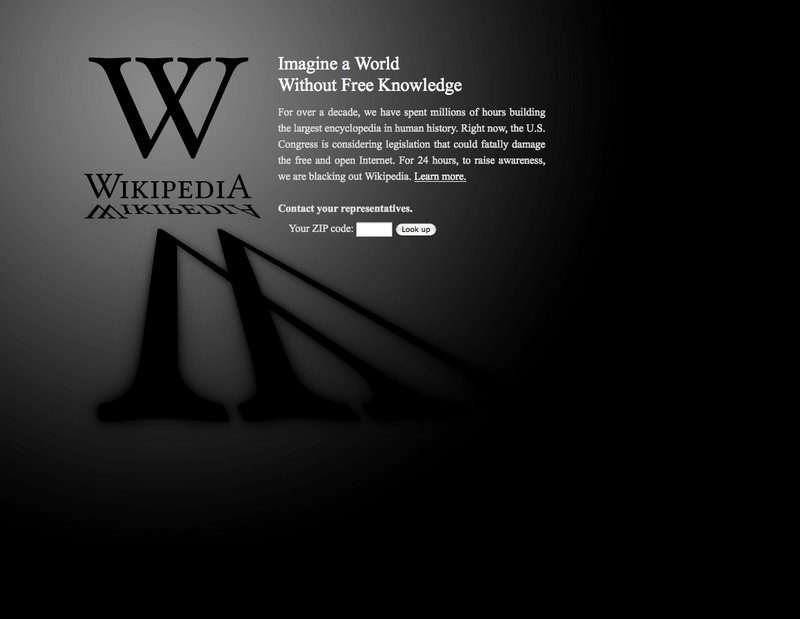WASHINGTON – Outspent but hardly outgunned, online and high-tech companies triggered an avalanche of Internet clicks to force Congress to shelve legislation that would curb online piracy. They outmaneuvered the entertainment industry and other old guard business interests, leaving them bitter and befuddled.
Before Senate and House leaders set aside the legislation Friday, the movie and music lobbies and other Washington fixtures, including the U.S. Chamber of Commerce, had put in play their usually reliable tactics to rally support for the bills.
There were email campaigns, television and print ads in important states, a Times Square billboard, and uncounted phone calls and visits to congressional offices in Washington and around the country. That included about 20 trips to the Capitol by leaders of the National Songwriters Association International, often accompanied by songwriters who performed their hits for lawmakers and their staffs.
“We bring our guitars on our backs,” said songwriter Steve Bogard, the association’s president.
Such campaigns are often music to the ears of lawmakers. This time, however, it was smothered by an online outpouring against the legislation that culminated Wednesday. According to organizers, at least 75,000 websites temporarily went dark that day, including the English-language online encyclopedia Wikipedia, joined by 25,000 blogs.
“The U.S. Congress is considering legislation that could fatally damage the free and open Internet,” said a message on Wikipedia’s home page, which was shrouded in shadows and provided links to help visitors reach their members of Congress.
Thousands of other sites posted messages protesting the bills and urging people to contact lawmakers. Protest leaders say that resulted in 3 million emails.
Google, its logo hidden beneath a stark black rectangle, solicited 7 million signatures on a petition opposing the bills. Craigslist counted 30,000 phone calls to lawmakers and there were 3.9 million tweets on Twitter about the bills, according to NetCoalition, which represents leading Internet and high tech companies.
“It’s still something we’re trying to comprehend,” said Google spokeswoman Samantha Smith. “We had such an overwhelming response to our petition that it honestly far exceeded our expectations.”
As co-sponsors of the bills peeled away, Senate Majority Leader Harry Reid, D-Nev., on Friday postponed a vote that had been set for this Tuesday on moving to the legislation. The vote seemed doomed well beforehand. Rep. Lamar Smith, R-Texas, chairman of the House Judiciary Committee, also put off further work. “I have heard from the critics,” he said.
Just weeks ago, the bills seemed headed toward quiet approval with bipartisan backing that ranging from liberals such as Rep. Howard Berman, D-Calif., to conservatives such as Sen. Marco Rubio, R-Fla. The turnabout was so unexpected that some think the online world’s triumph signals a pivotal moment marking its arrival as Washington’s newest power broker.
“This does serve as a watershed moment,” said Jennifer Stromer-Galley, a communications professor at the State University of New York at Albany who studies how political groups use high technology. “Certain channels for communication that people routinely use have the power to get their users to become political activists on their behalf.”
Both bills are aimed at thwarting illegal downloads and sales of thousands of American movies, songs and books, as well as counterfeit pharmaceuticals, software and other copyrighted products. They would do so by making it easier to stop American websites and search engines from steering visitors to largely foreign websites that pirate the items.
Supporters estimate that online piracy costs the U.S. at least $100 billion annually and thousands of jobs; even the bills’ critics say sales of pirated products must be stopped. But foes say the legislation goes too far, threatening to curb Internet free speech, stifle online innovation and burden online businesses with damaging regulations.
“People love their Internet. They use it every day, they don’t want it to change and they don’t want Washington messing with it,” said Maura Corbett, spokeswoman for NetCoalition.
Send questions/comments to the editors.



Success. Please wait for the page to reload. If the page does not reload within 5 seconds, please refresh the page.
Enter your email and password to access comments.
Hi, to comment on stories you must . This profile is in addition to your subscription and website login.
Already have a commenting profile? .
Invalid username/password.
Please check your email to confirm and complete your registration.
Only subscribers are eligible to post comments. Please subscribe or login first for digital access. Here’s why.
Use the form below to reset your password. When you've submitted your account email, we will send an email with a reset code.